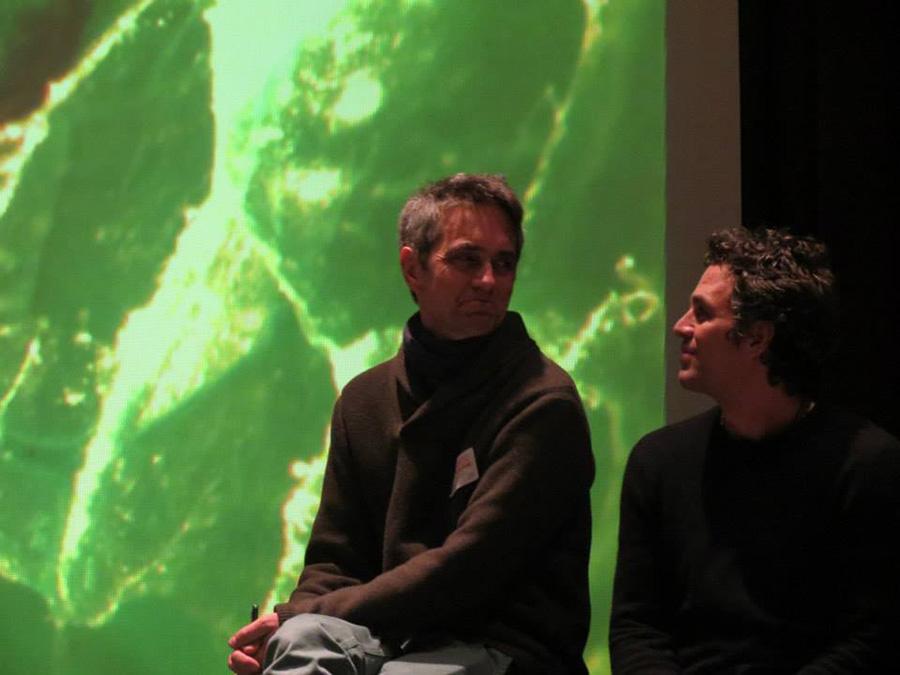Your donation will support the student journalists of Barnstable High School. Your contribution will allow us to purchase equipment and cover our annual website hosting costs.
Photo by Claire Sawayanagi
Mark Ruffalo speaks at BHS about local water defense.
Hulk and Scientist Team up for Water Defense Talk at BHS
Activist Mark Ruffalo visits BHS to discuss water quality problems and solutions
February 26, 2014
What’s the worst oil spill you’ve ever heard of, or rather, haven’t heard of?
According to Scott Smith, Chief Scientist of Water Defense, an organization working to protect and conserve clean water, it’s in Barnstable Harbor.
“Why?” Smith said, “There’s no oil spill. The oil and chemicals are coming from everyday road runoff.”
Founder and inventor of OpFlex open-cell foam technology, Smith tested water quality at various locations around Cape Cod, including Barnstable Harbor, Crosby Yacht Yard, and the pond outside of the Cape Cod Mall. While they may seem clean on the surface, a more in depth look revealed the water contained an abundance of harmful contaminates; the legal limit for chemical particles in water is ten parts per million (ppm), but the levels in Barnstable Harbor alone skyrocketed to 152 ppm–contamination equivalent to that of an actual oil spill.
Smith revealed his findings at a presentation in Barnstable High School’s Performing Arts Center Tues. Feb. 5 to several different environmental science classes. Alongside him were Water Defense founder and actor Mark Ruffalo, and Water Defense Executive Director John Pratt.
Ruffalo founded the organization after a visit to Pennsylvania, where companies were hydrofracking, shooting highly pressurized water mixed with chemicals to break up the ground, for natural gas.
Initially, Ruffalo didn’t see the problem, mistaking the initiative as a positive for job growth. It was only after the governor of Pennsylvania tweeted a warning that residents shouldn’t drink their tap water, that Ruffalo realized there was a huge issue.
“Nearly 400 people couldn’t use the water coming out of their tap. I thought ‘that doesn’t happen in America, that happens in third world countries!’” Ruffalo said. “We think we’re beyond this, but we’re not…Our fresh water is under attack.”
Ruffalo said that this among other issues “brought people together for Water Defense.” Pratt partnered with Ruffalo after his daughter Nayana, 12 years old at the time, witnessed fracking and blasting mountain tops for coal right across the street from her school. She constantly asked him what he would do about the fracking, and finally called his friend, Ruffalo.
The trio’s presentation aimed to engage the younger generations in the conversation, and to let students know by understanding the problems our world is facing with water quality, said Ruffalo.
Smith began with how he founded OpFlex; after losing his whole company in the 500 year flood, Smith realized that the solution was beneath the surface. He explained that while water can look fresh and clean from the upper water column, there’s still a possibility it’s unsafe due to chemicals settled in the lower water column. He developed the special kind of foam to help test out his findings.
In addition to the presentation held earlier that morning, Smith, Pratt and Ruffalo demonstrated in Mr. Gregory Hill’s chemistry lab how the OpFlex foam technology works. Smith and Ruffalo chose two participants, Emily Penn and Colleen Morin, to help pour 30 ml of oil into two large tanks they had set up in the classroom.
Since oil is hydrophobic and didn’t blend with the water but rather remained on the surface, when the OpFlex foam pad was submerged the oil was immediately absorbed– but not the water. Smith said that this was the intention, to create a device that would cleanse polluted water by filtering the oil and chemicals out while the clean water remained.
OpFlex foam, modeled after the human lung, attracts and traps oil and contaminates, but doesn’t harm the water or the surrounding plants. “It’s biomimicry…Lungs breath in contamination and breath out water,” Smith said.
It’s even recyclable, the flexible material is wrung out after each use, so the contaminates can be easily disposed of.
“They can be reused up to 100 times,” Ruffalo said, unlike the standard white plumes that are used to soak up oil.
Smith began visiting sites all around the country and testing water quality at different levels. His findings were astounding, seen in a video at a coal ash spill in Eden, North Carolina, where a stormwater pipe broke. Smith demonstrated an instantaneous water test by dipping a glass jar “for a split second” into the surface of the water. This method is used by government agencies to test for clean water, but Smith claims it isn’t accurate.
“Fish don’t live in water for a split second, and we don’t bathe in or drink water for a split second. Why are we relying on split second results?” Smith said.
By tossing a 12 foot long environmental indicator into the water made from OpFlex foam that sinks to different levels of the water column, Smith shows that water on the bottom was still contaminated “at all depths of the water.”
He then submerged a glove in the water for three minutes, and compared it to the instantaneous water sample he took earlier. There were over 800,000 ppm of harmful chemicals found on the glove.
Smith feels that no one wants to be held accountable, and major corporations feel that just because they are following the rules, there isn’t a problem.
“All people have a right to clean water, and all people have a right to know what’s in their water,” Ruffalo agreed, “But it’s more difficult to understand what’s in our water because industries and political groups make water a political issue.
“The most harmful chemicals are odorless, and people could be exposed to those and get sick,” Ruffalo said.
